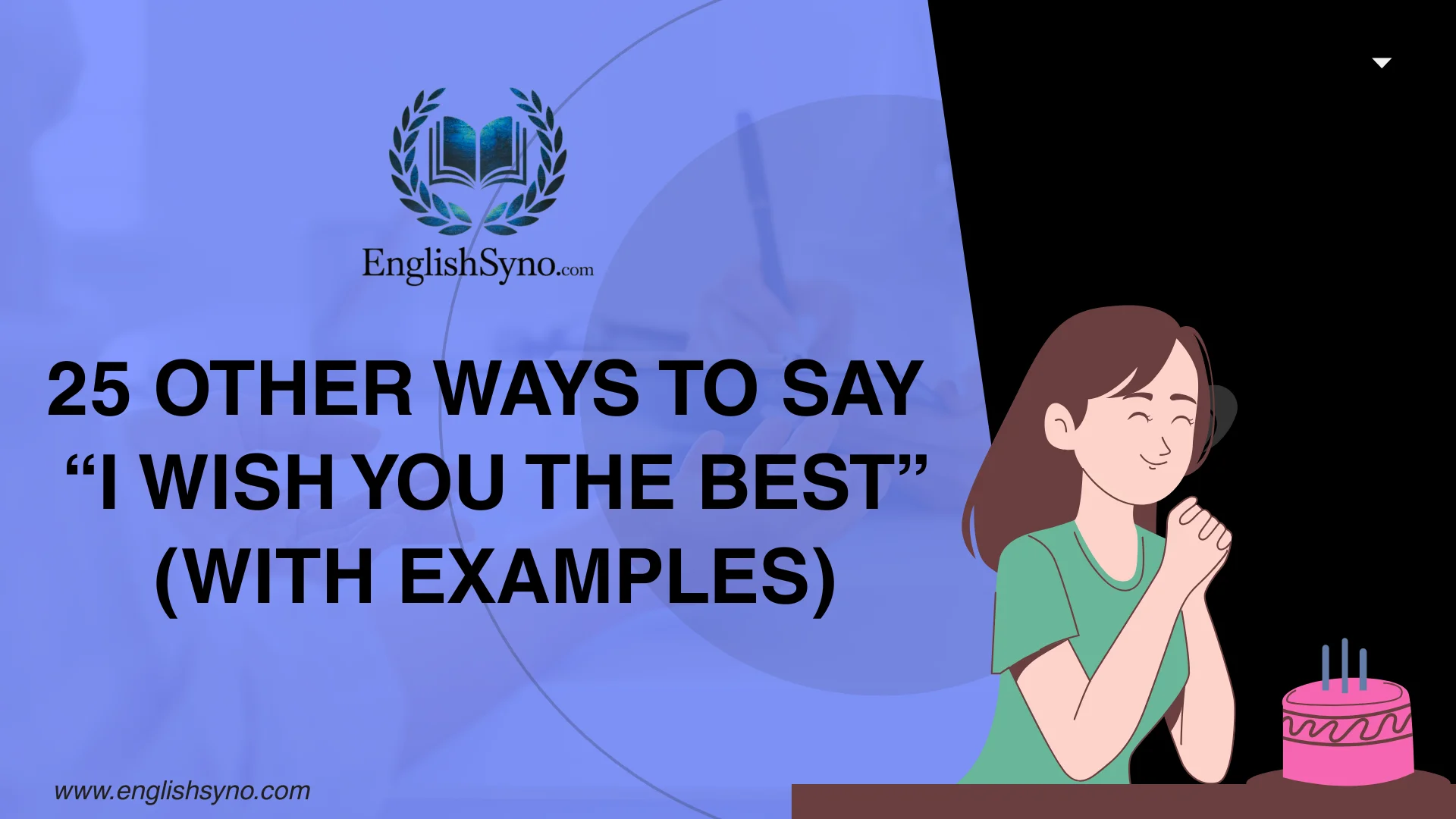Whenever someone is leaving a job or place, I wish you the best in this new venture, sending hope, goodwill, and happiness.
Even in moments inspired by art, like the Lewis Capaldi song “Wish You The Best” or corresponding film adaptation, this phrase resonates with heartfelt emotions.
What Does “I Wish You The Best” Mean?
Definition & Meaning: “I Wish You The Best” is a common expression used to show goodwill, hope, and support for someone’s happiness, success, or future endeavors.
Detailed Explanation: It conveys sincere intentions, whether in farewells, celebrations, or when someone is starting something new. The phrase can be used in casual, professional, or personal contexts depending on tone.
When to Use “I Wish You The Best”
Use this phrase when:
- Someone is leaving a job or a place.
- A friend or colleague is starting a new project or venture.
- Sending well-wishes for graduations, promotions, or life milestones.
- Writing farewell messages, emails, or notes of encouragement.
Is It Professional/Polite to Say “I Wish You The Best”?
Yes. It is a polite, respectful, and professional way to express positive intentions. It works in both formal and informal contexts, as long as the tone matches the situation.
Pros and Cons
Pros:
- Universally understood and appreciated.
- Flexible for formal and casual use.
- Conveys sincere support and goodwill.
Cons:
- Can feel generic if overused.
- May seem less personal without context or personalization.
All the Best
Definition & Meaning: A short, casual version of I Wish You The Best, expressing support and positivity.
Example: “Good luck with your presentation tomorrow. All the Best!”
Best Use: Casual emails, texts, friendly notes.
Worst Use: Formal business proposals where more specificity is preferred.
Tone: Friendly, supportive.
Best of Luck
Definition & Meaning: Emphasizes wishing someone success in a new endeavor or challenge.
Example: “You’ve got this exam. Best of Luck!”
Best Use: Academic, competitive, or task-focused situations.
Worst Use: Too casual for serious professional contexts.
Tone: Encouraging, upbeat.
Wishing You Success
Definition & Meaning: Directly expresses hope for someone’s achievements.
Example: “Starting your new business? Wishing You Success every step of the way.”
Best Use: Career milestones, entrepreneurial ventures.
Worst Use: Casual farewells among friends without context.
Tone: Professional, aspirational.
Hope Everything Goes Well
Definition & Meaning: A gentle, supportive phrase for upcoming events or challenges.
Example: “Your interview is tomorrow? Hope Everything Goes Well!”
Best Use: Personal messages, informal emails.
Worst Use: Not ideal for formal congratulatory letters.
Tone: Caring, light.
Sending You My Best Wishes
Definition & Meaning: A formal and heartfelt way to convey goodwill and support.
Example: “On your graduation day, Sending You My Best Wishes for a bright future.”
Best Use: Formal occasions, letters, or ceremonial messages.
Worst Use: Casual chat messages; may feel overly formal.
Tone: Formal, considerate.
All My Best
Definition & Meaning: A personal, concise version of best wishes, often signed off in emails or letters.
Example: “It’s been great working with you. All My Best!”
Best Use: Email sign-offs, farewell notes.
Worst Use: Direct oral communication; sounds odd verbally.
Tone: Warm, friendly.
Good Luck
Definition & Meaning: A simple phrase for wishing success in challenges or tasks.
Example: “Tomorrow’s your first day? Good Luck!”
Best Use: Casual, friendly settings.
Worst Use: Too informal for business letters or formal congratulations.
Tone: Casual, upbeat.
I’m Rooting for You
Definition & Meaning: Expresses personal support and emotional encouragement.
Example: “Big presentation today! I’m Rooting for You.”
Best Use: Personal, emotional encouragement.
Worst Use: Formal corporate letters.
Tone: Friendly, personal.
May Success Follow You
Definition & Meaning: A poetic, aspirational phrase wishing ongoing achievement.
Example: “As you start your journey, May Success Follow You everywhere you go.”
Best Use: Speeches, ceremonial messages.
Worst Use: Casual notes; may sound exaggerated.
Tone: Formal, inspirational.
Here’s to Your Success
Definition & Meaning: Celebratory, often used in toasts or milestones.
Example: “Here’s to Your Success in the new project!”
Best Use: Toasts, congratulatory speeches.
Worst Use: Routine emails; loses impact.
Tone: Warm, celebratory.
Wishing You the Greatest
Definition & Meaning: Extends goodwill with emphasis on being “the greatest” in success or happiness.
Example: “As you start college, Wishing You the Greatest experiences and memories.”
Best Use: Personal letters, cards, or ceremonies.
Worst Use: Could sound exaggerated in professional emails.
Tone: Enthusiastic, heartfelt.
I Hope It Goes Well
Definition & Meaning: Gentle, casual hope for a positive outcome.
Example: “New project today? I Hope It Goes Well!”
Best Use: Casual encouragement.
Worst Use: Formal messages; too casual.
Tone: Supportive, light.
Wishing You All the Happiness
Definition & Meaning: Focuses on emotional well-being rather than achievements.
Example: “Moving into your new home? Wishing You All the Happiness in it!”
Best Use: Personal notes, close friends or family.
Worst Use: Work-related messages; may feel sentimental.
Tone: Warm, heartfelt.
Hope You Have a Great Time
Definition & Meaning: Encourages enjoyment or positive experience.
Example: “Vacation next week? Hope You Have a Great Time!”
Best Use: Personal events, holidays, trips.
Worst Use: Formal professional contexts.
Tone: Casual, cheerful.
May Fortune Favor You
Definition & Meaning: Poetic and slightly formal, wishing luck and success.
Example: “As you launch your startup, May Fortune Favor You in every endeavor.”
Best Use: Formal, ceremonial, or literary contexts.
Worst Use: Everyday casual messages.
Tone: Formal, aspirational.
Wishing You the Best of Everything
Definition & Meaning: Extends comprehensive good wishes for all aspects of life.
Example: “Graduating today? Wishing You the Best of Everything in the years ahead.”
Best Use: Cards, formal letters, speeches.
Worst Use: Casual, brief messages; may sound long.
Tone: Warm, comprehensive.
May You Thrive
Definition & Meaning: Encourages growth, success, and flourishing.
Example: “Starting your new role? May You Thrive in every challenge.”
Best Use: Professional, growth-focused encouragement.
Worst Use: Overly dramatic in casual conversation.
Tone: Inspirational, motivational.
Best Wishes for Your Future
Definition & Meaning: Directly expresses hope for upcoming endeavors.
Example: “Moving to a new city? Best Wishes for Your Future.”
Best Use: Farewell cards, graduation notes.
Worst Use: Informal texts; can sound formal.
Tone: Polite, considerate.
Wishing You Every Success
Definition & Meaning: Formal expression of hope for achievement in all endeavors.
Example: “As you begin your new position, Wishing You Every Success.”
Best Use: Professional letters, formal notes.
Worst Use: Casual notes; may feel stiff.
Tone: Professional, supportive.
Sending Positive Vibes
Definition & Meaning: Informal, friendly way to encourage optimism.
Example: “Big exam coming up? Sending Positive Vibes your way!”
Best Use: Friends, casual communication.
Worst Use: Formal workplace communication.
Tone: Light, encouraging.
Hope Your Dreams Come True
Definition & Meaning: Emotional and aspirational; emphasizes personal dreams.
Example: “Starting college? Hope Your Dreams Come True!”
Best Use: Personal messages, close relationships.
Worst Use: Business letters.
Tone: Heartfelt, sincere.
Wishing You Strength and Success
Definition & Meaning: Encourages both resilience and achievement.
Example: “New responsibilities at work? Wishing You Strength and Success.”
Best Use: Supportive, semi-formal.
Worst Use: Overly casual notes.
Tone: Encouraging, uplifting.
All the Luck in the World
Definition & Meaning: Over-the-top, warm encouragement.
Example: “Big performance tonight? All the Luck in the World to you!”
Best Use: Special events, performances.
Worst Use: Ordinary situations; feels exaggerated.
Tone: Cheerful, enthusiastic.
May You Shine
Definition & Meaning: Inspirational and motivational; highlights success and confidence.
Example: “Presentation tomorrow? May You Shine in front of everyone!”
Best Use: Motivational speeches, personal encouragement.
Worst Use: Routine professional emails.
Tone: Inspirational, uplifting.
Wishing You Joy and Success
Definition & Meaning: Emphasizes both happiness and achievement.
Example: “Wedding day wishes? Wishing You Joy and Success in your new life together.”
Best Use: Personal, meaningful occasions.
Worst Use: Overused in generic messages.
Tone: Warm, celebratory.
Final Thoughts
Finding the right words to convey care, support, or encouragement is more than just etiquette-it’s about connection. Saying “I Wish You The Best” is a timeless way to express goodwill, but exploring alternative phrases adds depth and personality to your message. Whether it’s a formal email, a farewell note, a celebratory card, or a casual text, choosing the right wording ensures your sentiment is received with warmth and sincerity. Using thoughtful alternatives such as “All the Best,” “Wishing You Success,” or “Hope Your Dreams Come True” allows you to tailor your expression to the situation, the relationship, and the emotional tone you wish to convey. Personalization, context, and sincerity are key. Over time, simple gestures like sending encouraging words can strengthen relationships, boost morale, and make moments memorable. The language of well-wishes is universal, yet small variations can make a big difference in impact. By understanding the nuances of each alternative phrase-its tone, best use, and potential pitfalls-you can communicate support in ways that feel authentic and resonate deeply. Remember, it’s not just the words, but the intention and thought behind them that leave a lasting impression. Incorporating these alternatives thoughtfully helps you express positivity, inspire confidence, and show genuine care. Whether in professional settings, personal interactions, or special occasions, using these phrases effectively makes your message more meaningful and memorable, ensuring your goodwill reaches the recipient in the most heartfelt way.
FAQs
What does “I Wish You The Best” mean?
It’s a phrase expressing goodwill, support, and hope for someone’s happiness, success, or future endeavors, used in personal and professional contexts.
When should I use “I Wish You The Best”?
Use it when someone is leaving a job, starting a new venture, graduating, or facing a new phase in life.
Is it professional to say “I Wish You The Best”?
Yes, it is polite and professional. The tone matters: formal in emails or letters, casual among friends.
Can “I Wish You The Best” be used in casual conversation?
Absolutely. It works in informal chats, texts, and personal messages, adding warmth and sincerity.
What are some good alternatives?
Examples include All the Best, Best of Luck, Wishing You Success, Sending Positive Vibes, and Hope Your Dreams Come True.
Is “All the Best” more casual than “I Wish You The Best”?
Yes. It’s friendly, concise, and suitable for informal emails, texts, and quick messages.
Can I use it for a graduation message?
Definitely. It conveys sincere wishes for success and happiness in the next chapter of life.
How do I make it more personal?
Include specific references to their achievements, upcoming projects, or personal milestones to make your message meaningful.
Are there phrases suitable for professional settings?
Yes. Use Wishing You Every Success, Best Wishes for Your Future, or May You Thrive in formal letters or corporate emails.
Can these phrases be used in speeches or presentations?
Absolutely. Phrases like Here’s to Your Success or May Success Follow You are effective in toasts and public addresses.
What tone is best when using these phrases?
Sincere, warm, and supportive tones resonate best. Avoid sarcasm or generic wording.
Are poetic alternatives acceptable?
Yes. Phrases like May Fortune Favor You or May You Shine are suitable for ceremonies or inspirational contexts.
Can “Good Luck” replace “I Wish You The Best”?
Yes, but it’s more casual and task-focused, ideal for exams, performances, or challenges.
What’s the worst use of these phrases?
Overusing them or using them sarcastically can reduce sincerity and impact. Context and personalization are key.
Why are alternative phrases important?
They help convey care with nuance, making messages feel more thoughtful, personal, and memorable in any situation.

Muhammad Altaf is an English language specialist and professional content strategist with over 10 years of experience writing and teaching practical English usage, professional communication, and tone awareness. His work focuses on helping readers express ideas clearly, naturally, and confidently in real-world contexts.


